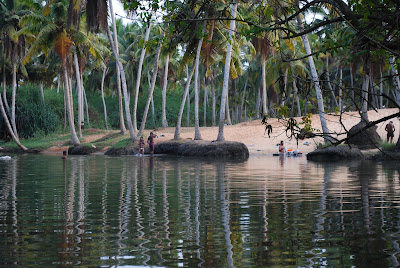As grey skies poured rain on my bus ride home from a weekend New York City today, I read a recent essay by Gretchen Legler in Orion, The Happiness Index: Putting people before profit in Bhutan. The essay describes Bhutan's alternative social, economic, and environmental metric, Gross National Happiness, in the context of the country's and people's struggles "negotiating the wilderness of modernization without losing its soul," a soul that has so far been filled with organic food and resided in lush, untouched environmental beauty, a soul being challenged by the opening of its borders and the cautious welcoming of what we call "modernization."
Sadly for Legler, she found in Bhutan a new found obsession with the modern world in which "traditions and nature are taking a backseat to convenience." For example, traditional, handcrafted bamboo food containers call bangchung replaced by "plastic insulated containers made in China, exported to Thailand, flown to India, and trucked over the southern borders."
After a three-day hike to to the holy lake Dragipangtsho, or "in the lap of the mountain," Legler and her group drink tea around a fire on the lake shore. She reflects:
When we finally arrive at the holy lake, it is nearly night...But even with the fire and tea, this is a fierce place. Magnifying this eerie scene is that we are camped in what feels like a garbage dump, surrounded by piles of plastic litchi juice containers, candy and gum wrappers, packaging from dried noodle soups, clear plastic Bhutanese gin and vodka bottles, worn out trousers, a blue rubber boot.I stare outside the bus window along I-95, and see a congruent scene rushing by my eyes at seventy miles per hour: junk of all kinds littering the shore of the highway, the shore of forested lands. While many have benefited from a paradigm of environmental destruction, modern society's most boundless production is pollution, waste, and trash, refuse strewn across landscapes, leeching unwanted chemicals into our soil and water, ending up in living bodies, cancerous.
"I begin to pick up trash and toss it into the fire," Legler writes. "Karma stops me in alarm: "No! You must not burn trash beside a holy lake! It will offend and anger the local deities."...[W]hile burning garbage beside a holy lake is taboo, leaving garbage as of yet seems to carry no spiritual repercussions. The incongruity of it hangs over us all."
I do not live trash or recycling free anymore, but I live a changed life because of this journey, because of where I live. Climate change resilience, low-cost air pollution sensors to fight for environmental justice, the politics of the Environmental Protection Agency, protests against the Keystone XL pipeline, anti-drone summits...my new home, this nation's capital, has provided new outlets for socioecological engagement, and alternative concepts and paradigms to think about, act on, build. I am fortunate to be here, and I am looking forward to what is next.













